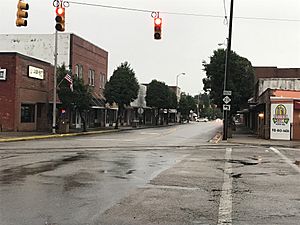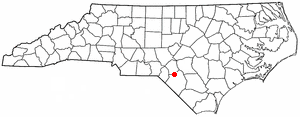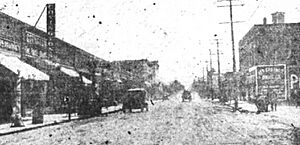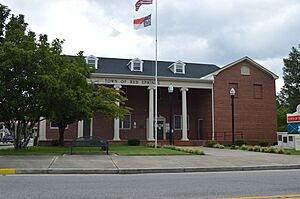Red Springs, North Carolina facts for kids
Quick facts for kids
Red Springs
|
|
|---|---|

Main Street
|
|

Location within the state of North Carolina
|
|
| Country | United States |
| State | North Carolina |
| Counties | Robeson |
| Area | |
| • Total | 3.67 sq mi (9.50 km2) |
| • Land | 3.50 sq mi (9.07 km2) |
| • Water | 0.17 sq mi (0.44 km2) |
| Elevation | 200 ft (60 m) |
| Population
(2020)
|
|
| • Total | 3,087 |
| • Density | 882.00/sq mi (340.50/km2) |
| Time zone | UTC-5 (Eastern (EST)) |
| • Summer (DST) | UTC-4 (EDT) |
| ZIP code |
28377
|
| Area codes | 910, 472 |
| FIPS code | 37-55660 |
| GNIS feature ID | 2407187 |
Red Springs is a small town located in Robeson County, North Carolina, in the United States. In 2020, about 3,087 people lived there. It's known for its interesting history and community spirit.
Contents
Where is Red Springs Located?
Red Springs is in the northern part of Robeson County. Important roads like North Carolina Highways 211 and 71 go through the town. These roads help connect Red Springs to other nearby towns. For example, NC-211 goes north to Raeford and southeast to Lumberton. NC-71 leads northeast to Lumber Bridge and southwest to Maxton.
How Big is Red Springs?
The town of Red Springs covers an area of about 9.5 square kilometers (3.67 square miles). Most of this area is land, with a small part being water.
What is the History of Red Springs?
One of the first people to settle in this area was "Sailor Hector" McNeill. He received a special land grant from King George III in 1775. This grant covered the land where Red Springs would later be built.
Why is it Called Red Springs?
In the mid-1800s, people came to this area for its mineral springs. These springs had water with a rusty, reddish color. This is how the town got its name, "Red Springs." A post office opened in 1884, first called Dora, but then changed to Red Springs a year later because of the unique spring water.
When Did Red Springs Become a Town?
The community officially became a town in 1887. This happened thanks to a local leader named Hamilton McMillan. Around this time, a local newspaper called the Scottish Chief also started publishing.
What About Education in Red Springs?
Red Springs once had a military school for boys and a music school for girls. The music school, called the Southern Conservatory of Music, later became Flora McDonald College. Today, it is known as Flora McDonald Academy, which is a private school.
Did Red Springs Have Baseball Teams?
Yes, Red Springs had professional minor league baseball teams!
- From 1947 to 1950, the Red Springs Red Robins played here. They were connected to the Philadelphia Athletics team. The Red Robins even won championships in 1948 and 1949.
- In 1969, another team, the Red Springs Twins, played in the town. They were part of the Minnesota Twins organization. This team was quite popular, drawing over 40,000 fans in one year!
Who Lives in Red Springs?
The population of Red Springs was 3,087 people in 2020. The town is home to a diverse group of people.
What is the Population Breakdown?
Here's a look at the different groups of people living in Red Springs, based on the 2020 census:
- White (non-Hispanic): 25.36%
- Black or African American (non-Hispanic): 42.53%
- Native American: 14.38%
- Asian: 0.26%
- Pacific Islander: 0.03%
- Other/Mixed races: 5.05%
- Hispanic or Latino: 12.37%
In 2020, there were 1,342 households and 777 families living in Red Springs.
Images for kids
See also
 In Spanish: Red Springs para niños
In Spanish: Red Springs para niños





